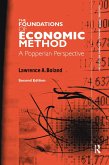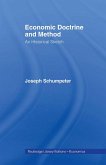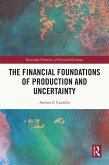49,95 €
49,95 €
inkl. MwSt.
Sofort per Download lieferbar

25 °P sammeln
49,95 €
Als Download kaufen

49,95 €
inkl. MwSt.
Sofort per Download lieferbar

25 °P sammeln
Jetzt verschenken
Alle Infos zum eBook verschenken
49,95 €
inkl. MwSt.
Sofort per Download lieferbar
Alle Infos zum eBook verschenken

25 °P sammeln
- Format: PDF
- Merkliste
- Auf die Merkliste
- Bewerten Bewerten
- Teilen
- Produkt teilen
- Produkterinnerung
- Produkterinnerung

Bitte loggen Sie sich zunächst in Ihr Kundenkonto ein oder registrieren Sie sich bei
bücher.de, um das eBook-Abo tolino select nutzen zu können.
Hier können Sie sich einloggen
Hier können Sie sich einloggen
Sie sind bereits eingeloggt. Klicken Sie auf 2. tolino select Abo, um fortzufahren.

Bitte loggen Sie sich zunächst in Ihr Kundenkonto ein oder registrieren Sie sich bei bücher.de, um das eBook-Abo tolino select nutzen zu können.
This updated edition is radically changed from the original and will be much appreciated by thinkers within economics. Boland is back.
- Geräte: PC
- mit Kopierschutz
- eBook Hilfe
- Größe: 2.25MB
Andere Kunden interessierten sich auch für
![Foundations of Economic Method (eBook, PDF) Foundations of Economic Method (eBook, PDF)]() Lawrence A. BolandFoundations of Economic Method (eBook, PDF)56,95 €
Lawrence A. BolandFoundations of Economic Method (eBook, PDF)56,95 €![Theory and Method of Evolutionary Political Economy (eBook, PDF) Theory and Method of Evolutionary Political Economy (eBook, PDF)]() Theory and Method of Evolutionary Political Economy (eBook, PDF)41,95 €
Theory and Method of Evolutionary Political Economy (eBook, PDF)41,95 €![John Stuart Mill on Economic Theory and Method (eBook, PDF) John Stuart Mill on Economic Theory and Method (eBook, PDF)]() John Stuart Mill on Economic Theory and Method (eBook, PDF)23,95 €
John Stuart Mill on Economic Theory and Method (eBook, PDF)23,95 €![Economic Doctrine and Method (eBook, PDF) Economic Doctrine and Method (eBook, PDF)]() Joseph SchumpeterEconomic Doctrine and Method (eBook, PDF)53,95 €
Joseph SchumpeterEconomic Doctrine and Method (eBook, PDF)53,95 €![The Financial Foundations of Production and Uncertainty (eBook, PDF) The Financial Foundations of Production and Uncertainty (eBook, PDF)]() Andres F. CantilloThe Financial Foundations of Production and Uncertainty (eBook, PDF)42,95 €
Andres F. CantilloThe Financial Foundations of Production and Uncertainty (eBook, PDF)42,95 €![The Flawed Foundations of General Equilibrium Theory (eBook, PDF) The Flawed Foundations of General Equilibrium Theory (eBook, PDF)]() Frank AckermanThe Flawed Foundations of General Equilibrium Theory (eBook, PDF)46,95 €
Frank AckermanThe Flawed Foundations of General Equilibrium Theory (eBook, PDF)46,95 €![On Abstract and Historical Hypotheses and on Value Judgments in Economic Sciences (eBook, PDF) On Abstract and Historical Hypotheses and on Value Judgments in Economic Sciences (eBook, PDF)]() Luigi EinaudiOn Abstract and Historical Hypotheses and on Value Judgments in Economic Sciences (eBook, PDF)28,95 €
Luigi EinaudiOn Abstract and Historical Hypotheses and on Value Judgments in Economic Sciences (eBook, PDF)28,95 €-
-
-
This updated edition is radically changed from the original and will be much appreciated by thinkers within economics. Boland is back.
Dieser Download kann aus rechtlichen Gründen nur mit Rechnungsadresse in A, B, BG, CY, CZ, D, DK, EW, E, FIN, F, GR, HR, H, IRL, I, LT, L, LR, M, NL, PL, P, R, S, SLO, SK ausgeliefert werden.
Produktdetails
- Produktdetails
- Verlag: Taylor & Francis eBooks
- Seitenzahl: 360
- Erscheinungstermin: 17. April 2003
- Englisch
- ISBN-13: 9781134498093
- Artikelnr.: 42982797
- Verlag: Taylor & Francis eBooks
- Seitenzahl: 360
- Erscheinungstermin: 17. April 2003
- Englisch
- ISBN-13: 9781134498093
- Artikelnr.: 42982797
- Herstellerkennzeichnung Die Herstellerinformationen sind derzeit nicht verfügbar.
Lawrence A. Boland is Professor of Economics at Simon Fraser University, Canada. He has published widely within economic methodology and is a fellow of the Royal Society of Canada.
Prologue: Understanding the Methodology of Economics Part 1: The 'Hidden
Agenda' of Neoclassical Economics 1. The problem of Induction vs. the
Problem with Induction 2. The Explanatory Problem of Individualism Part 2:
The Visible Agenda of Neoclassical Economics 3. Rationality vs.
Maximization 4. Maximization and Game Theory Part 3: Critical Applied
Methodology 5. Ideal-Type Methodology and Intrumentalism 6.
Psychologistic-Individualism and the Methodology of New Institutional
Economics 7. Equilibrium-based Explanations vs. Individualism 8. Imperfect
Knowledge vs. Imperfect Behaviour 9. From Macroseconomics to Evolutionary
Game Theory 10.Time and Evolution in Economic Theory Part 4: A Critique of
Traditional Economic Methodology 11.Intrumentalism vs. Conventionalism:
Against Rule-based Methodology 12.Optimistic and Defeatist Conventionalism
13.Falsifiability without Popper an the Agenda Part 5: Putting Popper on
the Agenda 14.Understanding Popper's Theory of Science 15.Situational
Analysis and Neocalssical Explanation Part 6: Applied Methodology for
Economics Model Building 16.Knowledge and Learning in Economic Models
17.Individualism and Social Knowledge 18.Obstacles to Building Realistic
Models. Epilogue: Problem-oriented Methodology: Towards a Popperian
'small-m' Methodology of Economics
Agenda' of Neoclassical Economics 1. The problem of Induction vs. the
Problem with Induction 2. The Explanatory Problem of Individualism Part 2:
The Visible Agenda of Neoclassical Economics 3. Rationality vs.
Maximization 4. Maximization and Game Theory Part 3: Critical Applied
Methodology 5. Ideal-Type Methodology and Intrumentalism 6.
Psychologistic-Individualism and the Methodology of New Institutional
Economics 7. Equilibrium-based Explanations vs. Individualism 8. Imperfect
Knowledge vs. Imperfect Behaviour 9. From Macroseconomics to Evolutionary
Game Theory 10.Time and Evolution in Economic Theory Part 4: A Critique of
Traditional Economic Methodology 11.Intrumentalism vs. Conventionalism:
Against Rule-based Methodology 12.Optimistic and Defeatist Conventionalism
13.Falsifiability without Popper an the Agenda Part 5: Putting Popper on
the Agenda 14.Understanding Popper's Theory of Science 15.Situational
Analysis and Neocalssical Explanation Part 6: Applied Methodology for
Economics Model Building 16.Knowledge and Learning in Economic Models
17.Individualism and Social Knowledge 18.Obstacles to Building Realistic
Models. Epilogue: Problem-oriented Methodology: Towards a Popperian
'small-m' Methodology of Economics
Prologue: Understanding the Methodology of Economics Part 1: The 'Hidden
Agenda' of Neoclassical Economics 1. The problem of Induction vs. the
Problem with Induction 2. The Explanatory Problem of Individualism Part 2:
The Visible Agenda of Neoclassical Economics 3. Rationality vs.
Maximization 4. Maximization and Game Theory Part 3: Critical Applied
Methodology 5. Ideal-Type Methodology and Intrumentalism 6.
Psychologistic-Individualism and the Methodology of New Institutional
Economics 7. Equilibrium-based Explanations vs. Individualism 8. Imperfect
Knowledge vs. Imperfect Behaviour 9. From Macroseconomics to Evolutionary
Game Theory 10.Time and Evolution in Economic Theory Part 4: A Critique of
Traditional Economic Methodology 11.Intrumentalism vs. Conventionalism:
Against Rule-based Methodology 12.Optimistic and Defeatist Conventionalism
13.Falsifiability without Popper an the Agenda Part 5: Putting Popper on
the Agenda 14.Understanding Popper's Theory of Science 15.Situational
Analysis and Neocalssical Explanation Part 6: Applied Methodology for
Economics Model Building 16.Knowledge and Learning in Economic Models
17.Individualism and Social Knowledge 18.Obstacles to Building Realistic
Models. Epilogue: Problem-oriented Methodology: Towards a Popperian
'small-m' Methodology of Economics
Agenda' of Neoclassical Economics 1. The problem of Induction vs. the
Problem with Induction 2. The Explanatory Problem of Individualism Part 2:
The Visible Agenda of Neoclassical Economics 3. Rationality vs.
Maximization 4. Maximization and Game Theory Part 3: Critical Applied
Methodology 5. Ideal-Type Methodology and Intrumentalism 6.
Psychologistic-Individualism and the Methodology of New Institutional
Economics 7. Equilibrium-based Explanations vs. Individualism 8. Imperfect
Knowledge vs. Imperfect Behaviour 9. From Macroseconomics to Evolutionary
Game Theory 10.Time and Evolution in Economic Theory Part 4: A Critique of
Traditional Economic Methodology 11.Intrumentalism vs. Conventionalism:
Against Rule-based Methodology 12.Optimistic and Defeatist Conventionalism
13.Falsifiability without Popper an the Agenda Part 5: Putting Popper on
the Agenda 14.Understanding Popper's Theory of Science 15.Situational
Analysis and Neocalssical Explanation Part 6: Applied Methodology for
Economics Model Building 16.Knowledge and Learning in Economic Models
17.Individualism and Social Knowledge 18.Obstacles to Building Realistic
Models. Epilogue: Problem-oriented Methodology: Towards a Popperian
'small-m' Methodology of Economics







